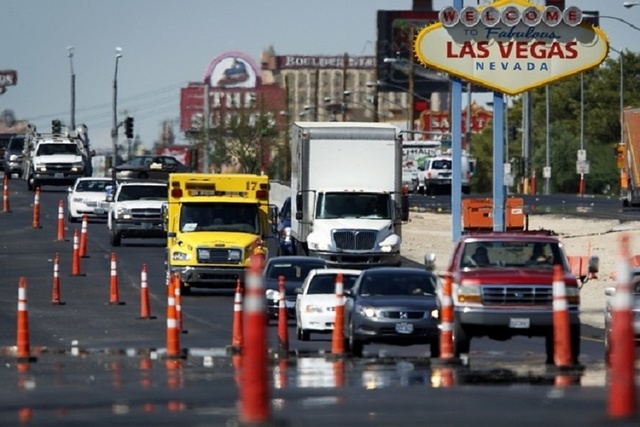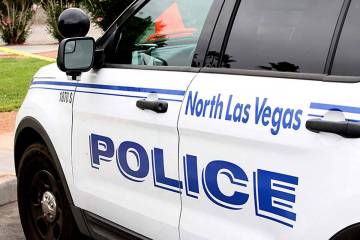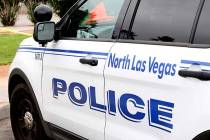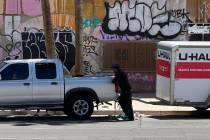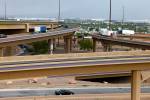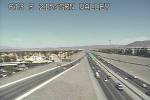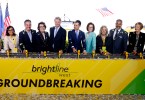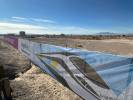Study finds poorly maintained Las Vegas roads take motorists for a $1,744 ride
Sitting on traffic-clogged roads, hurtling over potholes and crashing into other cars cost $1,744 annually for the average Las Vegas driver — a figure much lower compared to what motorists pay in Los Angeles, New York or Memphis, according to a study released Tuesday.
Additionally, about 34 percent of the Las Vegas Valley’s major streets and freeways are in poor or mediocre condition, making for a rough ride that drives up the cost of operating your vehicle, as reported by TRIP, a nonprofit transportation group in Washington, D.C.
“Those costs are already startlingly high, and they’ll grow even higher in the future, unless the state can find adequate transportation funding at the federal, state and local levels,” TRIP spokeswoman Carolyn Kelly said.
The report was released two week before Clark County voters head to the polls to consider Question 5, which calls for a 10-year extension of the fuel revenue index tax that took effect in 2013. If approved by a simple majority of voters, the tax would increase gradually each year as a way to generate about $3 billion that would help fund nearly 200 transportation projects.
Officials with the Regional Transportation Commission of Southern Nevada said they did not request the study from TRIP, which is funded by insurance companies, labor unions and businesses involved in highway and transit engineering.
“Road maintenance is not sexy, but it’s an essential part of our quality of life,” RTC General Manager Tina Quigley said. “The wear and tear on our vehicles, along with the safety challenges of maintenance, is something that we have to pay attention to and invest in.”
Poorly maintained roads lead to increased fuel consumption and damage to vehicles and are sometimes cited as the cause of accidents, according to TRIP’s report. 
The $1,744 annual average spent by Las Vegas motorists covers wasted fuel, lost productivity and general wear-and-tear caused by poorly maintained roads. Although the group did not compile a ranking, TRIP’s online data showed that drivers in the greater Los Angeles area spend $2,826 annually, New Yorkers spend $2,798 and Memphis motorists spend $1,821.
The report also found that more than one-third of the Las Vegas Valley’s major roads are poorly maintained, while 9 percent of the area’s bridges were deemed structurally deficient — meaning that they aren’t necessarily unsafe, but might require rehabilitation or replacement.
Surface streets concentrated in the older neighborhoods on the east side of Las Vegas have not been upgraded in about 10 years, including stretches of Hollywood Boulevard, Eastern Avenue and Nellis Boulevard, Quigley said.
Several state-maintained highways also require maintenance, but only some projects are currently funded, said Tony Illia, spokesman for the Nevada Department of Transportation.
A $12.9 million repair project is planned in 2018 for Tropicana Avenue between Dean Martin Drive and Boulder Highway, Illia said. That same year, Lake Mead Parkway is scheduled for a $3.4 million improvement project between U.S. Highway 95 and Boulder Highway.
Repairs are not budgeted, however, for a poorly maintained stretch of Jones Boulevard between Tropicana Avenue and U.S. Highway 95, Illia said.
If Question 5 is approved by voters, 74 road maintenance projects worth $755 million would be completed over the next decade across Clark County, Quigley said.
If Question 5 fails at the polls, then the RTC will continue to receive $58 million annually from state and federal sources, along with the remaining fuel tax funds approved in 2013 — just about enough money to “build an interchange or two,” Clark County Commissioner Larry Brown said.
“Federal dollars are shrinking; state dollars are shrinking,” said Brown, who also serves as the RTC’s board chairman. “It’s been placed on the shoulders of local government to pay for what traditionally has been subsidized heavily by the federal government.”
Contact Art Marroquin at amarroquin@reviewjournal.com or 702-383-0336. Find @AMarroquin_LV on Twitter.
THE COST OF DRIVING IN NEVADA
Driving on bad roads costs Nevada motorists about $3.2 billion. Here's where the money goes:
$1.6 billion: Lost times and wasted fuel due to congestion
$812 million: Vehicle depreciation, repairs, tire wear, increased fuel consumption
$804 million: Lost productivity at home and work, insurance, other costs
Source: TRIP, a national transportation research group in Washington, D.C.



